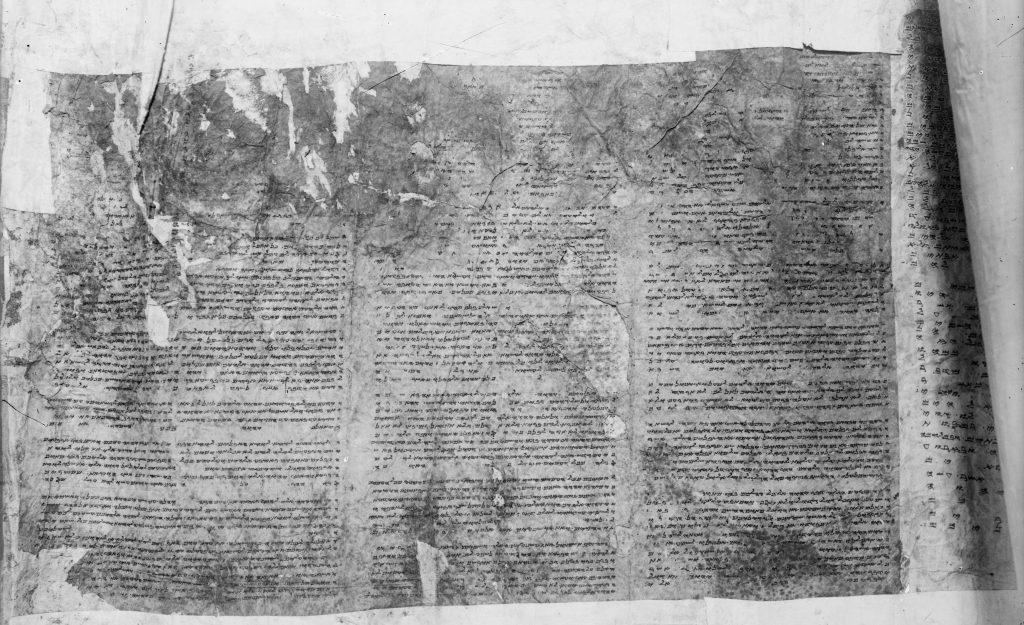Now Cain said to his brother Abel ………
The story of Cain and Abel is short. It has very few scenes of dialogue. It’s clear that the author was not trying to narrate a large part of Cain and Abel’s life. There is really only one or two points of the story, 1) that Abel’s attitude towards giving back to God was righteous and 2) that Cain was an example of a person who was lead by and overtaken by his sinful heart. However, when we read the story closer, it is clear that one piece of the story is missing. Once you notice it you will never be able to un-notice it. It’s what Cain said to Abel before he killed Abel in the first. The text has a glaring omission.
Cain told Abel his brother. And it came about when they were in the field, that Cain rose up against Abel his brother and killed him. (Genesis 4:8 NASB)
Now Cain talked with Abel his brother; and it came to pass, when they were in the field, that Cain rose up against Abel his brother and killed him. (Genesis 4:8 NKJV)
Cain spoke to Abel his brother. And when they were in the field, Cain rose up against his brother Abel and killed him. (Genesis 4:8 ESV)
The majority of all English translations have this line, “Cain said to Abel“, yet nothing is ever said. A few translations have tried various ways to gloss over this issue.
One of the only translations that have a different rendering is the 2011 NIV and the 2015 NLT. I make a point to draw a distinction between the new revisions and the previous ones because updates fixed a lot of errors that were previously ignored for the sake of tradition. However, I would like to point out that the 1989 NRSV fixed the problem many years ago. The NIV, NLT, and NRSV read,
Now Cain said to his brother Abel, “Let’s go out to the field.”While they were in the field, Cain attacked his brother Abel and killed him. (Genesis 4:8 NIV, 2011)
One day Cain suggested to his brother, “Let’s go out into the fields.” And while they were in the field, Cain attacked his brother, Abel, and killed him. (Genesis 4:8 NLT)
Cain said to his brother Abel, “Let us go out to the field.” And when they were in the field, Cain rose up against his brother Abel, and killed him. (Genesis 4:8 NRSV)
So why the big difference? And where did the additions or omissions come from? Why were they added just recent in history and not in 1611 when the KJV was translated?
Where did “Let’s go out into the fields.” come from?
The addition (or lack of omission) comes from various manuscripts in other languages that were not known previous to modern translations. Some of them are very old and well known yet overlooked and some were only recent discoveries. They are described below.
 Samaritan Pentateuch:
Samaritan Pentateuch:
The manuscript that is defined as the Samaritan Pentateuch is believed to be dated between 430-120 BCE. The dating is difficult because the language and precise wording used matches the Septuagint which was a Greek translation completed in 132 BCE.
Yet, it uses an alphabet and Hebrew form that is from before the exile of Israel by the Babylonians (580’s BCE). The Paleo-Hebrew used in the SP was phased out when the Babylonians took Judah captive. During the captivity the Israelites adopted the Aramaic alphabet and many Aramaic words. We call this Biblical Aramaic. In Jesus’ time it was a slightly different form of Aramaic. Most likely, the manuscript is closer to the 132 date yet it preserves a tradition and script that is much older.
The Samaritan Pentateuch was clearly the result of a slightly different manuscript tradition than the Masoretic tradition, which is what the KJV and many other English translations were based on. The Masoretic is a much later tradition that did not become well defined until a few centuries after Jesus. While it’s a great tradition of scribal work, it is not free from error. One such error is the obvious omission in Genesis 4:8 that nearly all the older manuscripts seem to have. Multiple manuscripts in various dates, locations, and languages all document and older reading of the text that was lost in the Masoretic.
Septuagint:
The Septuagint is the standard Greek translation of the Hebrew Old Testament. It was the primary OT source for the NT authors. We know this because nearly all NT quotations of the OT are word for word with the Greek OT and not the Masoretic Hebrew texts….. and sometimes not even the older Hebrew manuscripts that are known outside the Masoretic tradition. The Septuagint also contains the variant reading of Genesis 4:8. It was completed about 132 BCE and the manuscripts used to translate from are unknown. However, we now have manuscripts older than the Septuagint that thanks to the Dead Sea discovery. Many of the Dead Sea fragments and manuscripts match very well with the Septuagint.
Latin Vulgate:
The Latin Vulgate is one of the longest used biblical traditions. It was done by Jerome who was given the task by the Pope in 382 CE. It was used as the official text of the Catholic church for well over 1300 years. It was so well trusted that it was used in place of the Greek and Hebrew while translating the first English Bibles. This was done because early in the 1500’s many Greek and Hebrew manuscripts were still missing or not accessible to the translators of English. It also has the complete rendering of Genesis 4:8.
Syriac Peshitta:
The Syriac translation of the Hebrew OT is believed to have been done in the 1st century CE. The NT was translated later. But the Syriac translation seems to also come from the same or similar Hebrew source as the Septuagint. This means that There was likely a source that the previously mentioned translations all had access to. Of course it does not prove such a theory, it just suggests that it’s very possible and most scholars would say is quite likely. However, we also know that the Dead Sea scrolls have a large variation of readings.
Masoretic Text does not have “Let’s go out to the field.”
The Hebrew OT manuscripts that was carried on by the Jewish diaspora after Jerusalem was destroyed in 70 AD is known as the Masoretic texts. Of course, the oldest Masoretic manuscripts we have are only as old as 1000 CE, which is why they disagree so much with the older OT manuscripts. That is a lot of time to make and repeat scribal errors. In the case of Genesis 4:8 most would say the omission is a simple scribal mistake. But how did it make it into our translations?
When the original English translations were done they used Hebrew manuscripts from the rabbinic Masoretic texts edited by either Jacob Ben Chayyim or Felix Pratensis. KJV was translated quit faithfully from the Hebrew manuscripts. As such, they copied even the mistakes in the Masoretic texts. We see other errors as well in the English translations that used the MT.
Conclusion
In conclusion, it appears that Cain clearly said to Abel, “let’s go out to the field.” In the texts preserved in the Samaritan Pentateuch it would read,
(Genesis 4:8, Samaritan Pentateuch) ויאמר קין אל הבל אחיו נלכה השדה ויהי בהיותם בשדה ויקם קין אל הבל אחיו ויהרגהו׃
Alternatively, in the Greek Septuagint you would see,
καὶ εἶπεν Κάιν πρὸς Ἅβελ τὸν ἀδελφὸν αὐτοῦ Διέλθωμεν εἰς τὸ πεδίον. καὶ ἐγένετο ἐν τῷ εἶναι αὐτοὺς ἐν τῷ πεδίῳ καὶ ἀνέστη Κάιν ἐπὶ Ἅβελ τὸν ἀδελφὸν αὐτοῦ καὶ ἀπέκτεινεν αὐτόν. (Genesis 4:8, Septuagint)
The Syriac from the first century would read,
(Genesis 4:8, Syriac Peshitta) ܘܐܡܼܪ ܩܐܝܢ ܠܗܒܝܠ ܐܚܘܗܝ܂ ܢܪܕܐ ܠܦܩܥܬܐ܂ ܘܗܘܼܐ ܕܟܕ ܗܼܢܘܢ ܒܚܩܠܐ ܂ ܩܡ ܩܐܝܢ ܥܠ ܗܒܝܠ ܐܚܘܗܝ ܘܩܛܠܗ܂
And last but not least, the Latin from the Vulgate reads,
Dixitque Cain ad Abel fratrem suum egrediamur foras cumque essent in agro consurrexit Cain adversus fratrem suum Abel et interfecit eum. (Genesis 4:8, Latin Vulgate)

Hey, The Lord over the past few years has been revealing to me more of The meaning of His word since ive been given the most important revelation of keeping my faith believing in the Cross of Christ exclusively for everything we recieve from God. And learning the Holy Spirit will be able to fully do all that He wants to do in my life because im no longer grieving and frustrating him. Anyway ive recently noticed the above text in the verse mentioned here and asked Him what did Cain talk to Abel about. I asked several times over a few days and then after reading over the verse again He gave me a spiritual nudge to peer at the words and a knowing came into my heart of the meaning of what was discussed between the brothers. He revealed to me that they talked all about the Lord and the sacrifices and i Know Abel would Have talked about all about his relationship with the Lord and all the wonderfull things that are happenning for him since that day they both brought sacrifices. However many days ago thats been from that moment. And while they were talking the Spirit of the Lord would convict Cains heart of his own sinfullness and he would get angrier and hatred would get worse. To the point where the religious man killed the righteous man. Now thats what the Lord revealed to me and i know for certain that its true. Im pretty sure that what some of the manuscripts that are using the “lets go out to the field” rendering are just and older form of paraphrase like a thought for thought ,what some modern more easier to read translations are known for. I do think its interesting that the Holy Spirit said that Cain talked to Abel and Not that Abel talked to Cain. Like Cain initiated to conversation. And that my be, but i know from my own experiences over the last few years of me being on fire for telling others about what He is doin for me and teaching me and im basically getting myself into trouble sorta kinda at work and others. Anyway i know the Lord has a way of making His word read one way to those who dont know him and read a totally diferent way for those who are getting closer to Him. For example read Genesis 4:7 Notes are taken from Jimmy swaggarts expositors study bible. He tells cain if he does well, shell he not be accepted? (Means that if he brings the correct sacrifice and thereby places his faith) and if you do not do well, sin(a Sin-Offering) lies at the door(a lamb was at the door of the Tabernacle) and unto you shall be his desire, and you shall rule over him ( the Lord promised Cain dominion over the earth of that day, if he would only offer up, and place his trust in the right Sacrifice, He promises the same presently to all who trust Christ(Matt5:5)though we wont have that promise in its fullest till He returns i believe.
This is very interesting, but I must be missing the point. Do you think there is some significance to Cain saying this and that is why is was omitted? And if so, what is the significance? Do you think Abel knew what was coming? But trusted his brother anyway? Thanks.
I don’t think you’re missing anything Cynthia. The phrase isn’t significant. It’s omission appears to be an accident. Accidental omissions like this happen. In psalm 145 a similar mistake happens and an entire line of the acrostic was left out.
http://dustoffthebible.com/Blog-archive/2016/04/01/translation-errors-in-the-king-james-version-psalm-145-wheres-the-nun/